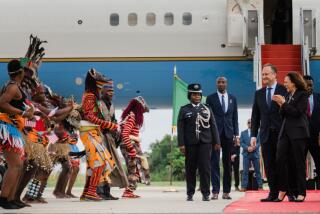Africa Redux
- Share via
Secretary of State Madeleine Albright has taken a strong first step in putting Africa back on the world’s geopolitical map after international indifference took hold with the end of the Cold War. The change is long overdue.
At a meeting sponsored by the Organization of African Unity in Addis Ababa, Ethiopia, America’s No. 1 diplomat signaled the willingness of the Clinton administration to pay more attention to the continent, to open a “new chapter” in multilateral relations. She plans stops in Uganda, Rwanda, Congo, Angola, South Africa and Zimbabwe before she returns to Washington later this week.
Albright’s initiative is correct, but no African leader should count on a return to the fat days of the 1960s, ‘70s and early ‘80s when massive aid flowed, impelled by the Soviet-American competition for influence.
Washington and Moscow competed aggressively and bountifully, flattering African heads of state, who responded by praising democracy or communism, depending on who was at the door. The money was handed over without regard to human rights abuses under tyrannical regimes that enriched themselves at the expense of impoverished majorities.
The flattery, and much of the assistance, stopped with the collapse of the Soviet Union. In the aftermath, ignored by Washington and abandoned by Moscow, many African leaders--with notable exceptions such as South Africa’s Nelson Mandela--were left to fend for themselves.
The West continued to respond to some crises, but the Somalia debacle of 1992 destroyed the remnants of international goodwill. “Compassion fatigue” washed over the donor nations. Famine, floods and fighting became “their” problem. Africa was dangerously adrift.
Now Albright says Africa cannot be ignored. If democracy fails to take root in Congo, formerly Zaire, the upheaval in this largest nation of Central Africa will set fire to neighboring regimes. West Africa is already beset by ongoing political crises in Nigeria, Liberia and Sierra Leone. East Africa is challenged by the anti-democratic policies of Kenya’s Daniel Arap Moi.
The United States should not give up. With its allies Washington can make a difference. It will take hard diplomacy, revived funding and constant attention, but the cost could not be higher than the risk of letting go. Africa matters.
More to Read
Sign up for Essential California
The most important California stories and recommendations in your inbox every morning.
You may occasionally receive promotional content from the Los Angeles Times.










